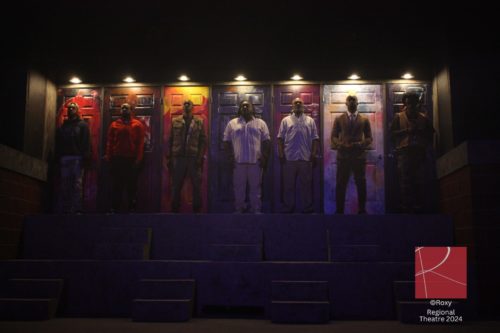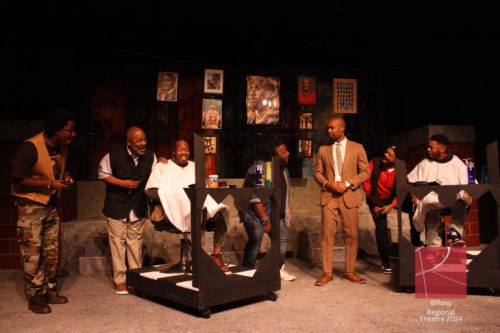Thoughts of a Colored Man: Town and Gown Triumph
The first morality play in Western culture was written in 12th-century Germany by a woman for women. Of its many characters, only one, the devil, was male. The most recent morality play was written in 21st-century New York by a man for men. As Mark Twain noted, “History never repeats itself, but it does often rhyme.”
For those who might have blocked out early college lit courses, a morality play pits good against evil, naming the characters for human emotions or character traits. Hildegard von Bingen, a convent abbess, wrote her allegory Ordo Virtutum [The Virtue’s Play] in the Bingen. Using music, narrative text, and poetry, it features one human soul torn between good, as represented by seventeen human virtues, and evil, the devil. Taking this unexpected, but still vital form, Keenan Scott II staged his allegory nearly 900 years later in Brooklyn. It features one human soul divided into seven characters. Using music, narrative text, and poetry, the characters address the unstaged demon of societal limits on black men.
Just as Hildegard’s art fought against the barriers of male dominance in Church hierarchy, Scott’s art broke barriers of white male dominance in modern American society, particularly Broadway, sometimes known as “The Great White Way.” Thoughts of a Colored Man is the first, the very first, play on Broadway written by a black man, directed by a black man, with a cast of all black men. In fact, in 2018 more than 93% of Broadway directors were white. Only 20% of shows were written by people of color. Although it ended its successful Broadway run only two years ago, the Roxy Regional Theatre was able to obtain the rights to produce the play in Clarksville, just north of Nashville. Kenneth L. Waters, Jr, the Roxy’s stage manager, and Scott, the playwright, are both alumni of Frostburg State in Maryland.
The performance was a triumph for town and gown collaboration as director Deonté Warren, Assistant Professor of Theater at Austin Peay State University, with Broadway credentials under his belt, worked wonders with APSU colleague Eboné Amos, who acted as costume designer, and a cast from varied points in the nation that included two Austin Peay alumni (playing Lust and Love).
The play traces one day in the life of seven varied black men: husbands, friends, coaches, working class, corporate class. Warren wisely chose a minimalist set of seven raised downstage doors, some painted with graffiti, with several pairs of steps leading to the stage floor where a bus stop and a drummer were on stage right, the drummer accompanying segments of slam poetry. The main set change was to the local barbershop, a sanctuary where all the men gathered.
Initially, the characters are not introduced by name, but when Jaylan Downes is constantly distracted by any woman happening by, when Branden Mangan constantly mourns lost dreams in his minimum wage job, and when Denzel McCausland, clearly the most prosperous of the crew, speaks in glowing terms of every aspect of his life, there is no doubt they portray Lust, Depression, and Happiness. Elliott Winston Robinson and Rosha Washington were also recognizable as Wisdom, an older sage, an immigrant from Nigeria and the barbershop owner, and Anger, a high school basketball coach whose glory days in professional ball were cut short by injury, but is more incensed by those taking advantage of the talented young men in his charge. It was a bit more difficult to distinguish between Corey Finley’s character as an idealistic poet, best friends with Lust, and Shawn Whitsell as Wisdom’s son-in-law expecting the elderly man’s first grandchild. Passion and Love are often too close to call.
Unlike medieval morality plays, Thoughts was a delicately nuanced portrayal of a black man’s complexities using poignant metaphors with fluid skill. Depression, for example, was an MIT student but could not pursue his dream of becoming an electrical engineer because his AIDs-ridden mother cannot raise his younger siblings alone. He gives his entire paltry earnings as a grocery store employee to his family, all the while thinking that “the aisles are fields and the cereal boxes and condiments are cotton.”  In the barbershop, one character who is hiding something finds himself surprised as the conversation moves from a humorously effective scene of their shared interest in a basketball game on TV closer to the more dangerous territory of his secret.
In the barbershop, one character who is hiding something finds himself surprised as the conversation moves from a humorously effective scene of their shared interest in a basketball game on TV closer to the more dangerous territory of his secret.
But the names can be deceptive; perhaps that is why they are not fully revealed until the last scene. The complex characters flow from anger to pathos, from fear to joy, from distance to empathy, just as in real people in real life. The audience, who often engaged in call and response with meaningful lines, is reminded that for black men in American society, “the color of our skin makes us men before we’re ready.” This prepares us for a tragic event.
Through the elegance and passion of his writing, well-interpreted by the actors, Scott implores us to see black men as people, complex people. Hildegard saw her works as “reflections of the living life,” the ultimate truth. When describing the play rehearsals for its New York premiere, Scott said “it’s been healing, it’s been therapy, sometimes it feels like church.” To that, we, the receptive audience, could only say, “Amen.” Ultimate truth.
This play is worth the drive from Nashville. The remaining performances will be held at 7 pm on February 22, 23, 24 and 2 pm February 24. There is free parking nearby and since the theater is in downtown Clarksville, food and drink at a French café, a steakhouse, and a pub/brewery are all less than a block away. Tickets are $35 (adults) and $15 (10 and under) and there’s a “dinner and show” package.
For more information: https://roxyregionaltheatre.org/thoughts-of-a-colored-man/



